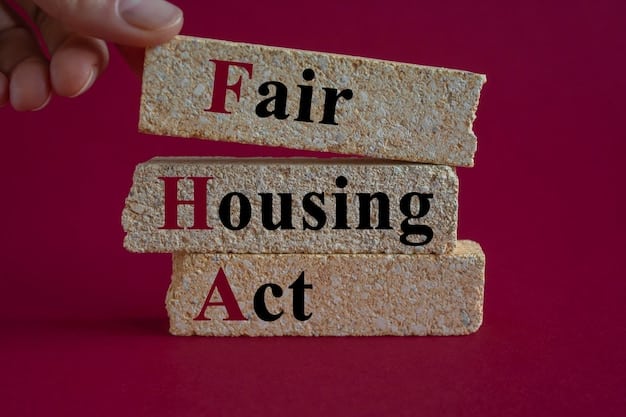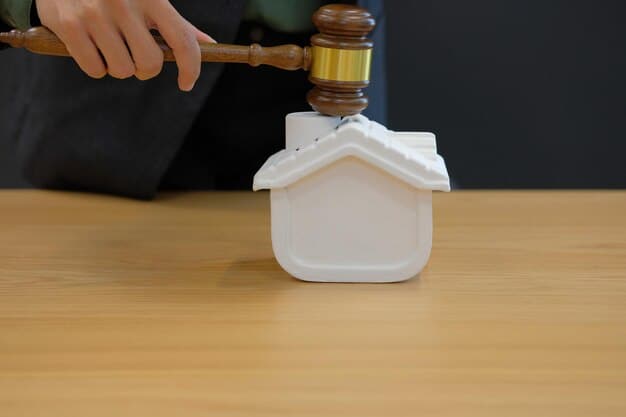Housing Discrimination: Legal Recourses for Victims in the US

Victims of housing discrimination in the US have several legal recourses, including filing complaints with the Department of Housing and Urban Development (HUD), pursuing lawsuits under the Fair Housing Act, and seeking assistance from state and local agencies, all aimed at achieving fair and equal housing opportunities.
Navigating the complexities of housing can be challenging, especially when facing discrimination. Understanding what are the legal recourses available to victims of discrimination in housing in the US, and how can they be accessed, is crucial for anyone seeking fair and equal housing opportunities.
Understanding Housing Discrimination in the US
Housing discrimination remains a persistent issue in the United States, impacting individuals and families across various demographics. It is essential to recognize what constitutes housing discrimination to protect your rights and take appropriate action.
What is Housing Discrimination?
Housing discrimination refers to any actions taken by landlords, property managers, sellers, or lenders that unfairly deny housing or housing-related services to individuals based on protected characteristics.
Protected Characteristics Under the Fair Housing Act
The Fair Housing Act prohibits discrimination based on several protected characteristics, including race, color, national origin, religion, sex (including gender identity and sexual orientation), familial status, and disability.
- Race: Discrimination based on a person’s racial background.
- Color: Discrimination based on skin color.
- National Origin: Discrimination based on a person’s country of origin or ancestry.
- Religion: Discrimination based on religious beliefs.
Recognizing these protected characteristics is the first step in identifying and addressing housing discrimination. Knowing your rights empowers you to seek legal recourses when necessary.

Filing a Complaint with the Department of Housing and Urban Development (HUD)
One of the primary legal recourses for victims of housing discrimination is filing a complaint with the U.S. Department of Housing and Urban Development (HUD). HUD is responsible for enforcing the Fair Housing Act, and filing a complaint can initiate an investigation into discriminatory practices.
How to File a Complaint
Filing a complaint with HUD can be done online, by mail, or by phone. The process involves providing detailed information about the alleged discrimination, including the date, location, and specific actions taken.
HUD’s Investigation Process
Once a complaint is filed, HUD will conduct an investigation to determine whether discrimination occurred. This may involve interviewing witnesses, reviewing documents, and gathering other relevant evidence. HUD aims to complete its investigation within 100 days.
Conciliation and Resolution
Throughout the investigation process, HUD may attempt to resolve the complaint through conciliation, which involves bringing the parties together to reach a voluntary agreement. If conciliation is unsuccessful, HUD may issue a charge of discrimination if there is reasonable cause to believe that discrimination occurred.
Filing a complaint with HUD is a crucial step in addressing housing discrimination, offering a structured process for investigation and potential resolution. Understanding this process can empower victims to seek justice and fair housing opportunities.
Pursuing a Lawsuit Under the Fair Housing Act
In addition to filing a complaint with HUD, victims of housing discrimination have the option to pursue a private lawsuit under the Fair Housing Act. This legal recourse allows individuals to seek monetary damages and injunctive relief to remedy discriminatory practices.
When to File a Lawsuit
A lawsuit can be filed either before or after filing a complaint with HUD. However, if HUD has already issued a charge of discrimination, the Attorney General may file a lawsuit on behalf of the aggrieved party.
Statute of Limitations
It is crucial to be aware of the statute of limitations for filing a lawsuit under the Fair Housing Act, which is generally two years from the date of the alleged discriminatory act. Missing this deadline can prevent you from pursuing legal action.
Types of Relief Available
Through a lawsuit, victims can seek various forms of relief, including compensatory damages to cover financial losses, punitive damages to penalize the discriminatory party, and injunctive relief to prevent future discrimination. Additionally, the court may award attorney’s fees and costs to the prevailing party.
- Compensatory Damages: Cover financial losses due to discrimination.
- Punitive Damages: Penalize the discriminatory party for their actions.
- Injunctive Relief: Prevents future discriminatory practices.
Pursuing a lawsuit under the Fair Housing Act provides victims with a direct avenue to seek justice and compensation for the harm caused by housing discrimination. Understanding the legal process and available relief is essential for those considering this option.

Seeking Assistance from State and Local Agencies
Many state and local governments have fair housing agencies that work to combat housing discrimination within their jurisdictions. These agencies can provide valuable resources, assistance, and enforcement mechanisms to help victims of discrimination.
Finding State and Local Agencies
State and local fair housing agencies can be found through online directories, government websites, or by contacting local city or county offices. These agencies often have specific mandates to investigate and resolve housing discrimination complaints.
Services Provided by These Agencies
These agencies offer a range of services, including investigating complaints, conducting fair housing training, providing legal assistance, and mediating disputes between landlords and tenants. They may also have the authority to issue fines or penalties for violations of fair housing laws.
Cooperation with HUD
Many state and local agencies have partnerships with HUD, allowing them to jointly investigate complaints and share resources. These partnerships can enhance the effectiveness of fair housing enforcement efforts at all levels of government.
Seeking assistance from state and local agencies can provide victims with additional support and resources to address housing discrimination. These agencies play a critical role in promoting fair housing practices and ensuring equal housing opportunities for all.
Understanding Disparate Impact and Disparate Treatment
To effectively combat housing discrimination, it is important to understand the concepts of disparate impact and disparate treatment. These legal theories are used to assess whether housing practices are discriminatory, even if they appear neutral on the surface.
Disparate Treatment
Disparate treatment refers to intentional discrimination, where a housing provider treats individuals differently based on their protected characteristics. This can include refusing to rent to someone based on their race or imposing different terms and conditions.
Disparate Impact
Disparate impact, on the other hand, occurs when a policy or practice that appears neutral has a disproportionately negative effect on members of a protected group. Even if the policy is not intentionally discriminatory, it can still violate the Fair Housing Act if it has an unjustified discriminatory effect.
Examples of Disparate Impact
Examples of disparate impact include imposing credit score requirements that disproportionately exclude minority applicants or implementing occupancy restrictions that effectively bar families with children. These policies can be challenged if they are not necessary to achieve a legitimate business purpose.
- Credit Score Requirements: Disproportionately exclude minority applicants.
- Occupancy Restrictions: Effectively bar families with children.
- Criminal Background Checks: May disproportionately affect certain racial groups.
Understanding the differences between disparate impact and disparate treatment is crucial for identifying and challenging housing discrimination. Both theories provide legal avenues for addressing discriminatory practices and promoting fair housing.
The Role of Legal Aid Societies and Non-Profit Organizations
Navigating the legal complexities of housing discrimination can be daunting, especially for those with limited resources. Legal aid societies and non-profit organizations play a vital role in providing free or low-cost legal assistance to victims of housing discrimination.
Finding Legal Assistance
Legal aid societies and non-profit organizations dedicated to fair housing can be found through online directories, bar associations, or by contacting local community centers. These organizations often have experience in handling housing discrimination cases and can provide valuable guidance.
Services Offered
These organizations offer a range of services, including legal advice, representation in administrative proceedings and lawsuits, fair housing education, and advocacy for policy changes. They can help victims understand their rights and navigate the legal process.
Pro Bono Representation
Many attorneys volunteer their time to provide pro bono representation to individuals who cannot afford legal services. Legal aid societies can connect victims of housing discrimination with attorneys willing to take on their cases without charge.
The support provided by legal aid societies and non-profit organizations is invaluable for ensuring that all individuals have access to justice in housing discrimination cases. These resources empower victims to assert their rights and challenge discriminatory practices.
| Key Aspect | Brief Description |
|---|---|
| 🏠 Filing a HUD Complaint | Report discrimination to HUD for investigation. |
| ⚖️ Fair Housing Lawsuit | Pursue a lawsuit for damages and injunctive relief. |
| 🏢 State/Local Agencies | Seek assistance from agencies for local support and enforcement. |
| 🧑⚖️ Legal Aid Societies | Get free/low-cost legal help from societies for victims. |
Frequently Asked Questions (FAQs)
▼
Housing discrimination occurs when a housing provider denies housing or imposes different terms based on protected characteristics like race, color, religion, sex, national origin, familial status, or disability.
▼
You generally have one year from the date of the alleged discriminatory act to file a complaint with HUD. It’s important to act promptly to preserve your rights.
▼
Yes, you can file a lawsuit directly in federal court. However, doing so may affect HUD’s ability to investigate the matter. The statute of limitations for lawsuits is typically two years.
▼
You may be able to recover compensatory damages for financial losses, punitive damages to punish the discriminatory party, and injunctive relief to prevent future discrimination. Additionally, attorney’s fees may be awarded.
▼
You can find legal assistance through legal aid societies, non-profit organizations, or by contacting your local bar association. Many offer free or low-cost services to victims of housing discrimination.
Conclusion
Understanding your rights and the available legal recourses is essential in combating housing discrimination. By filing complaints, pursuing lawsuits, and seeking assistance from state and local agencies, victims can fight for fair and equal housing opportunities.





